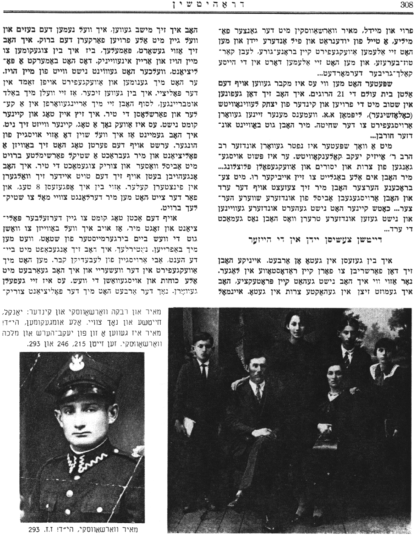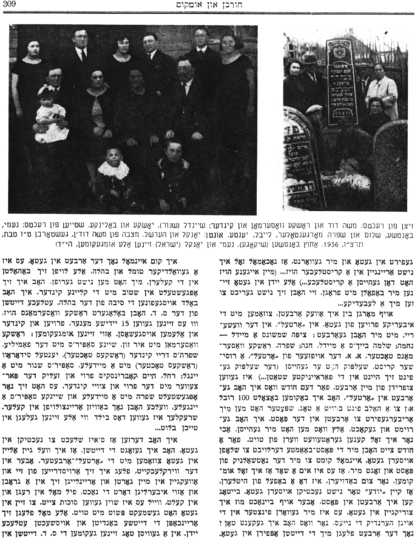
[Page 308]
Meir Warshavsky and his entire family; some of the Judenrat, and many other Jews. They were all taken away to Brona Gora near Kartuz-Bereza, where they were all murdered.
The 21 were later buried in the old cemetery. I was in my house with women and the children of Yitzchak Levinovitch (Kholozhiner), Lipman and others whose husbandsd were taken to be massacred. We mourned over our catastrophe. A week later our rabbi, R. Isaac Yaakov Kalenkovitch died. He simply died from all the suffering and mistreatment and died suddenly. We all accompanied him to his eternal rest, and with broken hearts we sat on the ground as mourners and wept even though no one heard our weeping or saw our tears that made the ground wet.
[photo:] Meir and Rivka Warshavsky and their children: Yankel, Chaytsha and two others. All perished. May G-d avenge their blood! Meir was a son of Yaakov Hersh and Malka Warshavsky. See pp. 215, 246 and 293.
[photo:] Meir Warshavsky. See p. 293.
Germans start shooting people at home
I went into the ghetto without a job. A few people signed up to go to the Radostov camp. However, since I had no connections, I had to remain in my dreadful situation in the ghetto. I then decided that I would take a broom and go with other women to clean off the cobblestone pavement. I shuffled along slowly until I got home and went inside. A policeman who lived nearby noticed this. He took me over to the police on the Sand Street. I was sure that I would be killed shortly, but they just locked me in a cellar. I spent a whole day there by myself, and then another day, without anyone showing up. I assumed I would die from hunger. On the fourth day a policeman appeared and brought me some moldy bread and a little water, and then closed the door. I then started wishing I would die instead of just lying around in a dark cellar. I spent eight days there, and I was given bread only twice.
On the eighth day the same policeman reappeared and told me that if I would wash the laundry well for the mayor, I would be released. Of course I was more than willing to do that just so I could get out of living grave. I was taken to the laundry and used all my strength to wash the laundry. It was good, but after the work was finished, the policeman returned me to the ghetto and warned me never to reenter a Christian house.

[Page 309]
[photo:] Seated from right: Moshe David and Rashka Wasserman and children: Sheidel (daughter-in-law), Yoshka and Balinka. Standing from right: Naomi, Bontcha, Shalom and Shifra Morgenthaler, Leibel, Yenta. Below: Yankel and Hershel. Gravestone of Moshe David, who died on January 11, 1936. Except for Bontcha (Chicago), Naomi and Yankel (Israel), everyone perished. May G-d avenge their blood! [Note: the gravestone in the front appears to include the name of Aharon Drogitchinsky]
(My own house was considered a Christian house). All the Jews in the ghetto asked me questions. They never expected to see me alive again.
The next day I went to work at the laundry workshop together with the remaining women in the ghetto. I worked with Tsippa Shimshons, a unmarried girl; Shlomo Beich's daughter Chana; Shifra, the daughter of Rashka Wasserman, and others. The workshop supervisor was a Russian Christian named Shelpuk (today he lives in the United States), and he liked my work. I received 100 rubles for my month's work in the workshop, and a half-pound of bread per day. Later I was transferred to the post office. I cleaned, cooked and did anything they asked me to do in order to stay alive. For one month as postal workers we were allowed to go out of the ghetto. The postal official once told me that it would be a shame for me to die, but unfortunately there was an order from Hitler that no Jew should spend the night outside the ghetto. During the day I could work in the post office, but at night I had to return to the ghetto. This was bad news for me, but what could I do? After work the Germans would return me to the ghetto.
Once after work I arrived in the ghetto to find chaos and confusion. Everyone was running to hide somewhere in cellars. I wasn't called, and so I remained at home with the small children. I soon discovered the reason for the tumult. A few German SD besieged Rashka Wasserman's house where there were fifteen Jewish men, women and children, and shot all of them. The dead were Rashka Wasserman and her son, Sheina Sapir's and family, Shifra's three children (Rashka's daughter), Yentel Sidorov (Rashka's daughter) and a young girl, Sapir's daughter-in-law and a child; Rachel, Chaim Kobrinsky's wife and Zelik from Partsev and his wife and two children. The only ones spared were Shifra and one of her young daughters, and a child of Sheinka Sapir's, who were able to hide in the cellar. The picture was horrible – everyone was lying in a pool of blood.
I realized that it was a bad idea to stay in the ghetto overnight, and I told the Germans that I would like to go into the ghetto together with the workshop workers. However, the truth was that I would get away from them and hide out in my garden in a hole, where I would spend the night, very often in the rain and cold, since it was already around the time of the festival of Sukkot. Remaining in the ghetto carried the smell of death. The German bandits would always catch and murder a few Jews. One day the German SD arrived at the Judenrat office and demanded silk stockings. The only person there at the time was Bontcha Valevelsky, who told the murderers that there wasn't any, and asked where he should find silk stockings. The savage murderers shot Bontcha
Previous Page |
Next Page
JewishGen, Inc. makes no representations regarding the accuracy of
the translation. The reader may wish to refer to the original material
for verification.
JewishGen is not responsible for inaccuracies or omissions in the original work and cannot rewrite or edit the text to correct inaccuracies and/or omissions.
Our mission is to produce a translation of the original work and we cannot verify the accuracy of statements or alter facts cited.
 Drogichin, Belarus
Drogichin, Belarus
 Yizkor Book Project
Yizkor Book Project
 JewishGen Home Page
JewishGen Home Page
Copyright © 1999-2025 by JewishGen, Inc.
Updated 13 Dec 2001 by LA